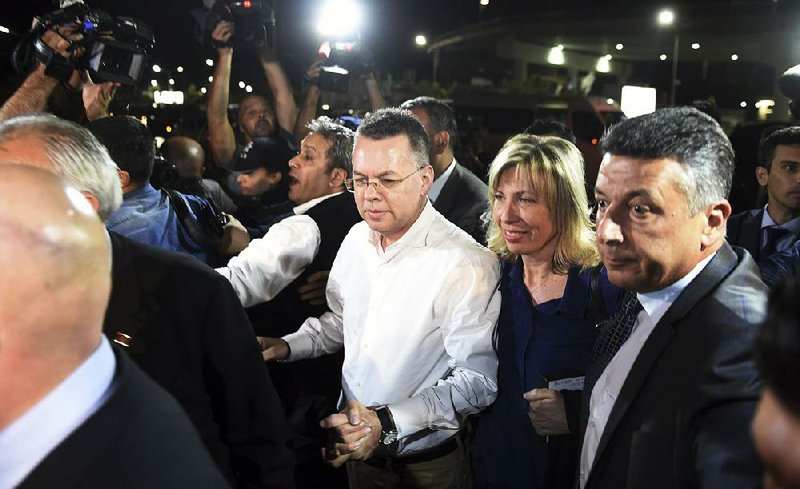SAKRAN, Turkey -- A Turkish court on Friday ordered the release of American pastor Andrew Brunson from house arrest, a move that ended his 24-month imprisonment and will allow him to fly home, and that signaled a truce of sorts in a heated diplomatic dispute between Turkey and the United States.
Brunson, who was accused of spying and aiding terrorists, had been sentenced to three years, one month and 15 days in prison, but the judge lifted all judicial controls -- including a ban on travel -- leaving him free to leave the country immediately because of a sentence reduction for good behavior and in view of time served.
Brunson left the courthouse by car shortly after the decision was announced, and U.S. officials following the case said he returned home to Izmir before departing for Germany en route to the United States.
President Donald Trump's administration had pressed hard for the release of Brunson, an evangelical pastor who runs the small Resurrection Church in Izmir. He was one of two dozen Americans detained in the aftermath of a failed coup in 2016 and was charged with aiding terrorist groups and espionage, charges he denies.
Trump and Vice President Mike Pence personally raised his case several times with President Recep Tayyip Erdogan of Turkey, the United States imposed financial sanctions and members of Congress traveled to Turkey to attend his trial.
"Thanks be to God," said the Rev. William Devlin of New York, who attended every hearing. "Pastor Brunson is going home. We thank the court, we thank Turkey and we thank President Erdogan."
Washington and Turkey have been involved in complex negotiations over Brunson's fate for months. U.S. officials had also pushed, unsuccessfully, for Brunson's release to include the freeing of Serkan Golge, a Turkish-American scientist, and three Turkish citizens who had worked at U.S. diplomatic missions.
After the pastor's release, Trump invited him to come to the White House as early as today. "We're very honored to have him back here with us," he told reporters in Ohio, where he was traveling for a campaign rally. "He suffered greatly."
Trump added that he made no concessions to secure Brunson's release.
"There was no deal made" for his release, he said.
Turkey is grappling with a growing economic crisis and has been anxious to reduce a fine of billions of dollars that the U.S. Treasury is expected to impose on the state-owned Turkish bank, Halkbank, for its part in a conspiracy to violate U.S. sanctions against Iran.
A bank official, Mehmet Hakan Atilla, was sentenced to 32 months' imprisonment in May in a Manhattan court for his part in the scheme.
Washington has accused Ankara of holding Brunson for use as leverage in its various disputes with the United States.
In particular, Turkey has requested the extradition from the United States of Islamist preacher Fethullah Gulen, whom it accuses of running a terrorist organization and of instigating the 2016 coup attempt. Erdogan once suggested a swap of the cleric and the pastor.
A Turkish court ordered that Brunson remain detained, though he was later moved to house arrest, and he has been living since August with his wife, Norine, at his apartment in Izmir. Since then, Turkish courts have several times refused his appeal for release on health grounds.
Washington reacted by imposing financial sanctions on the Turkish interior minister and justice minister. Days later, Trump announced that the United States was doubling its tariffs on steel and aluminum imports from Turkey, just as the Turkish currency, the lira, began a precipitous fall against the dollar.
Erdogan vowed that he would not succumb to threats, and announced retaliatory measures, including increased tariffs on imported U.S. cars, alcohol and leaf tobacco.
U.S. officials have said that the Turkish prosecutors presented no credible evidence to support their case, and the trial has produced few hard facts to support the notion that Brunson was involved in terrorism.
Information for this article was contributed by Jennifer Epstein and Justin Sink of Bloomberg News.
A Section on 10/13/2018

